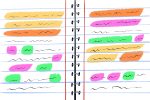For university students, note-taking is unavoidable. Given the amount of information that professors communicate and expect students to know, recording the facts for later reference is a necessity. Therefore, useful software that is conducive to fast and thorough note-taking proves to be an invaluable resource. These free note-taking programs will revolutionize and optimize your note-taking experience.
Notion
Notion is an application that has surged in popularity on TikTok — and for good reason. Notion provides a level of customization that is unavailable on many other note-taking platforms. This program is free for personal use and can be downloaded on iOS, Android, Mac and Windows. Notion can be used in a web browser like Chrome as well, and the program works best for text-based note-taking and complex or multi-level organizational patterns. Widgets for time and weather can be applied to Notion completely free of charge, allowing users to create a more personal atmosphere within the dashboard of the program. The Notion interface is also a valuable mechanism for personal organization; users can utilize it for planning and money management.
Nevertheless, no application is without faults, and the chief complaint among new Notion users is that it is quite complicated. Once a user masters the Notion interface, however, it becomes a lot easier to create a layout that is both beautiful and efficient. There are many free online templates and tutorials that serve as guides for some of the technical aspects of the program. Notion itself even released multiple templates for lists and charts, and these outlines are available directly through the site. On top of that, Notion also offers pre-designed layouts that can be used as springboards for creativity.
Standard Notes
As far as note-taking applications with more simplistic user interfaces, Standard Notes is one to behold. Standard Notes is available in various web browsers, and is compatible with Windows, Mac and Linux. The most valuable advantage of Standard Notes is that all content is end-to-end encrypted and therefore completely secure. This is extraordinarily uncommon in note-taking software, making Standard Notes a top choice for not just notes, but also journals, budgeting and anything else users hope to keep entirely private.
The most significant drawback of using Standard Notes is that its design features and extensions — which are needed to give the interface a touch of customization — come at a price of $59 a year or $11.99 a month. By paying for this plan (called the Productivity Plan), users gain access to customizable text and to-do lists. Fortunately, basic note-taking features and information encryption are completely free, so non-paying users can still reap some of the benefits of this program. If privacy and simplicity are of significant value to a student, Standard Notes is well worth the try.
Obsidian
Obsidian is a one-of-a-kind option for someone looking to take notes in a novel manner instead of a customary linear format. Obsidian takes a truly distinctive approach to note-taking; the interface is even described as a “second brain” on their website. This is because Obsidian uses a web-based format that allows users to organize their notes visually in a web shape, mimicking the way a human brain connect concepts. The meaningful and organized connections Obsidian makes between text-based notes make the app particularly intriguing, and Obsidian’s visual appeal is breathtaking.
Evernote
Evernote has the unique ability to sync across multiple platforms and integrate a wide variety of apps into the user experience, which is atypical of most platforms. This program is available on almost every platform, and provides a massive number of features. Unfortunately, the most useful or desired features are placed behind a paywall of $8.99 to $10.99 per month, depending on which features users want to add. Evernote also lacks end-to-end encryption, meaning that notes recorded within the program are much less secure than they would be in programs like Standard Notes. Overall, the cross-platform syncing and efficient search and reminder functions — things note-taking programs often lack — are the main reasons that users recommend Evernote. For these features alone, Evernote is worth trying before knocking.
Slite
Last but not least is Slite. Slite’s main advantage over other software is its potential for collaboration. Similar to Google Docs, Slite provides the opportunity to edit documents both with other users, making this a wonderful choice for those who engage in collaborative and asynchronous work. What’s more, Slite is free to use!
Honorable Mentions
Hundreds if not thousands of other note-taking platforms are available for students to use during their academic careers and beyond. Some other programs worth checking out include Google Docs, Milanote, Microsoft OneNote and Ulysses. Most notably, users have found significant value in a paid subscription to Milanote, which, like Obsidian, illustrates meaningful connections through mind maps.
Which program is the best?
The perfect writing program depends specifically on each student’s needs. A good option for someone who cares little about design and organization is Google Docs, which is quick and easy to access. For those who value privacy, Standard Notes is unmatched. Notion and Obsidian both provide a wonderful starting point for those looking to craft a highly personalized note-taking journey. Finding what works best for you will require research, trial and error and open-mindedness. These programs hold worlds of potential for revolutionizing organization and efficiency in note-taking. Try them out, you may just find your new favorite program!

















